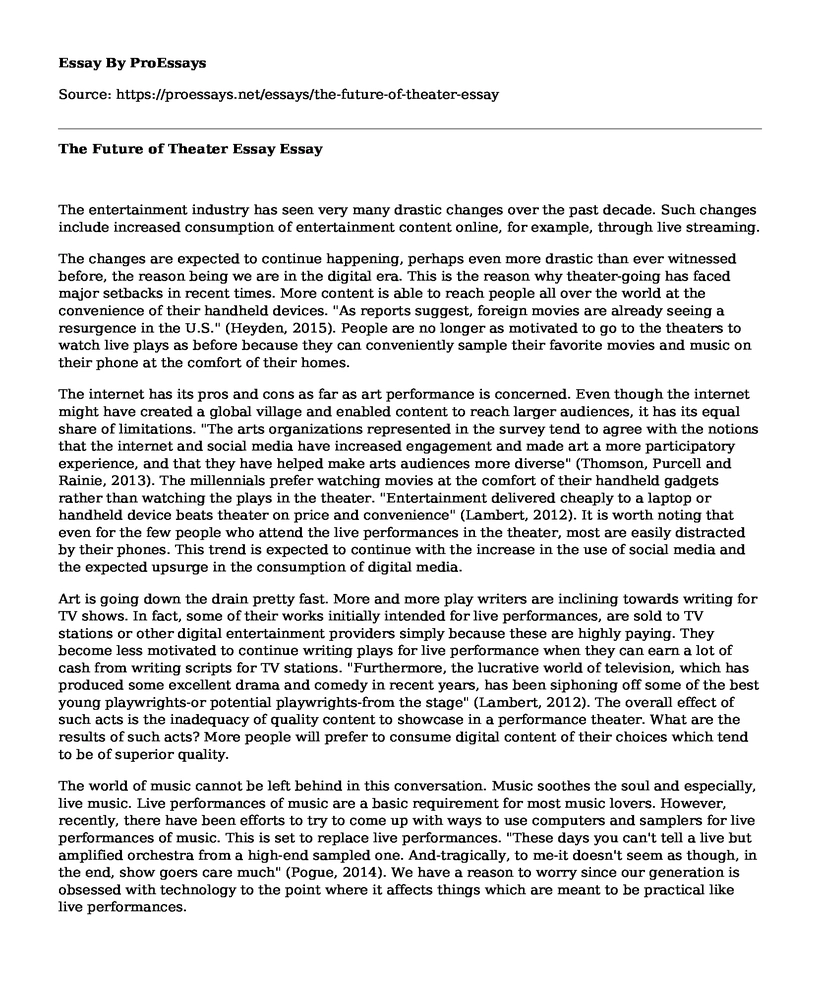The entertainment industry has seen very many drastic changes over the past decade. Such changes include increased consumption of entertainment content online, for example, through live streaming.
The changes are expected to continue happening, perhaps even more drastic than ever witnessed before, the reason being we are in the digital era. This is the reason why theater-going has faced major setbacks in recent times. More content is able to reach people all over the world at the convenience of their handheld devices. "As reports suggest, foreign movies are already seeing a resurgence in the U.S." (Heyden, 2015). People are no longer as motivated to go to the theaters to watch live plays as before because they can conveniently sample their favorite movies and music on their phone at the comfort of their homes.
The internet has its pros and cons as far as art performance is concerned. Even though the internet might have created a global village and enabled content to reach larger audiences, it has its equal share of limitations. "The arts organizations represented in the survey tend to agree with the notions that the internet and social media have increased engagement and made art a more participatory experience, and that they have helped make arts audiences more diverse" (Thomson, Purcell and Rainie, 2013). The millennials prefer watching movies at the comfort of their handheld gadgets rather than watching the plays in the theater. "Entertainment delivered cheaply to a laptop or handheld device beats theater on price and convenience" (Lambert, 2012). It is worth noting that even for the few people who attend the live performances in the theater, most are easily distracted by their phones. This trend is expected to continue with the increase in the use of social media and the expected upsurge in the consumption of digital media.
Art is going down the drain pretty fast. More and more play writers are inclining towards writing for TV shows. In fact, some of their works initially intended for live performances, are sold to TV stations or other digital entertainment providers simply because these are highly paying. They become less motivated to continue writing plays for live performance when they can earn a lot of cash from writing scripts for TV stations. "Furthermore, the lucrative world of television, which has produced some excellent drama and comedy in recent years, has been siphoning off some of the best young playwrights-or potential playwrights-from the stage" (Lambert, 2012). The overall effect of such acts is the inadequacy of quality content to showcase in a performance theater. What are the results of such acts? More people will prefer to consume digital content of their choices which tend to be of superior quality.
The world of music cannot be left behind in this conversation. Music soothes the soul and especially, live music. Live performances of music are a basic requirement for most music lovers. However, recently, there have been efforts to try to come up with ways to use computers and samplers for live performances of music. This is set to replace live performances. "These days you can't tell a live but amplified orchestra from a high-end sampled one. And-tragically, to me-it doesn't seem as though, in the end, show goers care much" (Pogue, 2014). We have a reason to worry since our generation is obsessed with technology to the point where it affects things which are meant to be practical like live performances.Conclusion
In conclusion, all industry players in the world of theater must ensure that art performances regain its lost glory. It might be easier to blame the young generation in order for some players to avoid responsibility for the imminent massive failure of theater that looms if there is no rigid intervention by all industry players.
References
Heyden, 2015. A look at the future of entertainment. Retrieved on April 25, 2019, from https://www.digitalistmag.com/digital-economy/2015/12/23/future-entertainment-industry-03885954.
Lambert, 2012. The Future of Theater. Retrieved on April 25, 2019, from https://harvardmagazine.com/2012/01/the-future-of-theater.
Pogue2, 2014. Why digital music looks set to replace live performances. Retrieved on April 25, 2019, from https://www.scientificamerican.com/article/why-digital-music-looks-set-to-replace-live-performances/.
Thomson, Purcell and Rainie, 2013. The overall impact of technology on the arts. Retrieved on April 25, 2019, from https://www.pewinternet.org/2013/01/04/section-6-overall-impact-of-technology-on-the-arts/.
Cite this page
The Future of Theater Essay. (2022, Mar 09). Retrieved from https://proessays.net/essays/the-future-of-theater-essay
If you are the original author of this essay and no longer wish to have it published on the ProEssays website, please click below to request its removal:
- Gender, Race and Media
- Analysis of Fictional Show "13 Reasons Why"
- Essay Sample on How Filmmakers Can Push Our Buttons Emotionally
- Film Analysis Essay on Modern Times
- A Tale of Two Natashas Film Essay Example
- Sustainable Wooden Doors: 3 Principles for Long Term Use - Essay Sample
- Paper Example on Citizenfour: NSA Exceeding Power & Compromising Security of People







